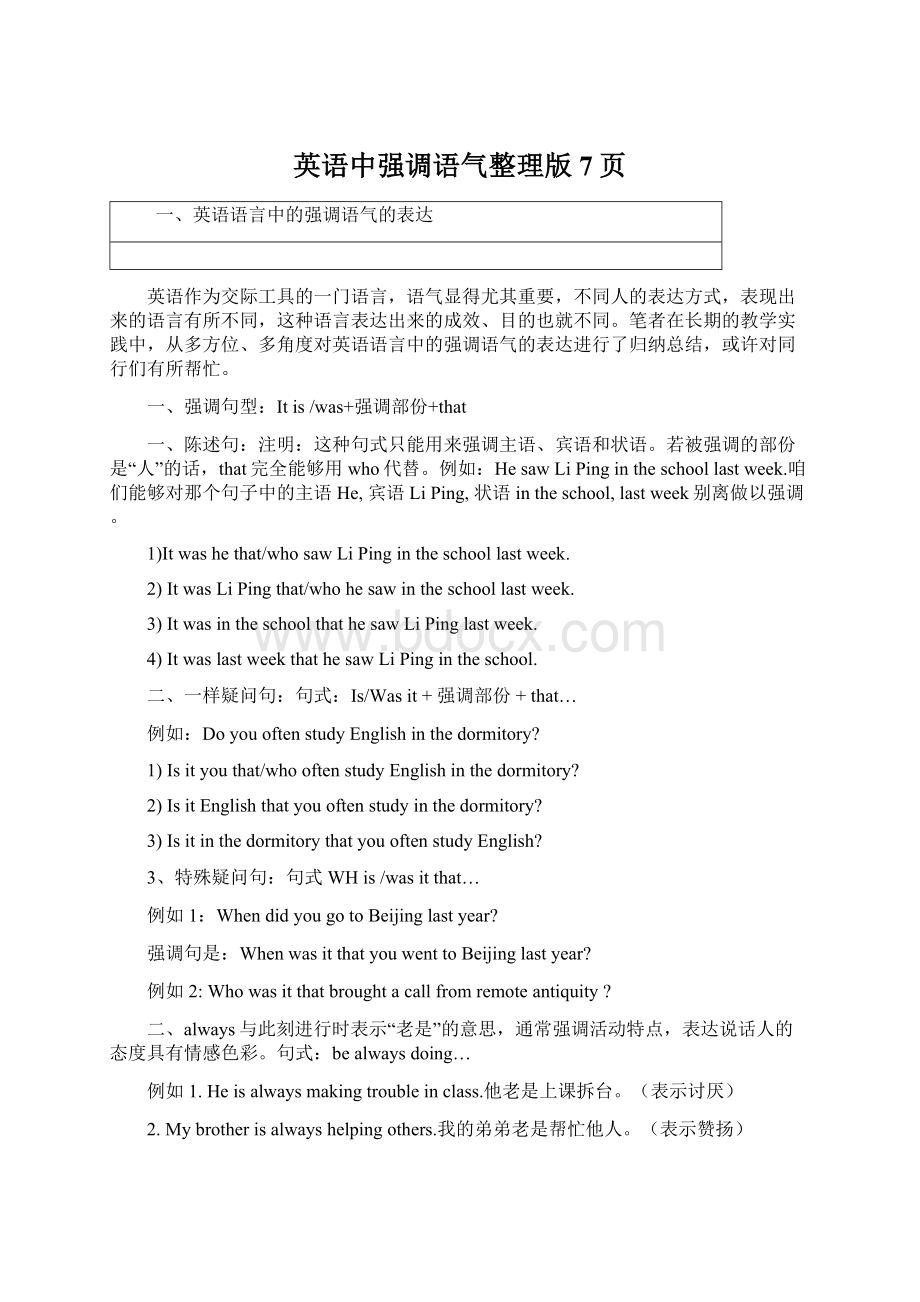英语中强调语气整理版7页.docx
《英语中强调语气整理版7页.docx》由会员分享,可在线阅读,更多相关《英语中强调语气整理版7页.docx(12页珍藏版)》请在冰豆网上搜索。

英语中强调语气整理版7页
一、英语语言中的强调语气的表达
英语作为交际工具的一门语言,语气显得尤其重要,不同人的表达方式,表现出来的语言有所不同,这种语言表达出来的成效、目的也就不同。
笔者在长期的教学实践中,从多方位、多角度对英语语言中的强调语气的表达进行了归纳总结,或许对同行们有所帮忙。
一、强调句型:
Itis/was+强调部份+that
一、陈述句:
注明:
这种句式只能用来强调主语、宾语和状语。
若被强调的部份是“人”的话,that完全能够用who代替。
例如:
HesawLiPingintheschoollastweek.咱们能够对那个句子中的主语He,宾语LiPing,状语intheschool, lastweek别离做以强调。
1)Itwashethat/whosawLiPingintheschoollastweek.
2)ItwasLiPingthat/whohesawintheschoollastweek.
3)ItwasintheschoolthathesawLiPinglastweek.
4)ItwaslastweekthathesawLiPingintheschool.
二、一样疑问句:
句式:
Is/Wasit+强调部份+that…
例如:
DoyouoftenstudyEnglishinthedormitory?
1)Isityouthat/whooftenstudyEnglishinthedormitory?
2)IsitEnglishthatyouoftenstudyinthedormitory?
3)IsitinthedormitorythatyouoftenstudyEnglish?
3、特殊疑问句:
句式WHis/wasitthat…
例如1:
WhendidyougotoBeijinglastyear?
强调句是:
WhenwasitthatyouwenttoBeijinglastyear?
例如2:
Whowasitthatbroughtacallfromremoteantiquity?
二、always与此刻进行时表示“老是”的意思,通常强调活动特点,表达说话人的态度具有情感色彩。
句式:
bealwaysdoing…
例如1.Heisalwaysmakingtroubleinclass.他老是上课拆台。
(表示讨厌)
2.Mybrotherisalwayshelpingothers.我的弟弟老是帮忙他人。
(表示赞扬)
三、onearth,underthesun,intheworld用在特殊疑问句词后面表示(究竟…,到底…)的意思
例如:
1.Whatonearthareyoudoingthere?
你究竟在那儿做什么?
2.Whereintheworlddidyougo?
你到底哪里去了?
3.Whenunderthesundidyougo?
你到底何时去?
四、ifany(如有的话),ifever(曾经),if…atall(全然)用在省略的从句增强主句语气
例如:
1.Correcttheerrorsinhiscomposition,ifany.若是他的作文里有错误,请更正。
2.Hehasbeenthereonce,ifever.若是说他去过那里的话,也只是一次。
3.Doitwellifyoudoitatall.要做就要做得好。
五、all(完全地,十分地)
例如:
1.1)Iamallforadoptingthenewtechnique.我十分同意采纳这项新技术。
2)Iamallformissingmymother.我十分想念我的母亲。
2.接the和比较级表示“加倍”。
例如:
WellIknowthatthere’sdangeraheadbutIamallthemoresetondrivingforward.明知征途有艰险,越是艰险越向前
六、ifonly(只要,若是…就好了)
例如:
1.Ifonlyitclearsupwe’llgo.只要天一转晴咱们就去。
2.Ifonlyyouhadworkedwithgreatercare!
你若是更认真些该多好啊!
七、The+比较级,the+比较级…(越…越)
例如:
higheryoustand,thefartheryoucansee.站得高看得远。
moreyoueat,thefatteryoubecome.吃得越多就会越胖
moreyoupractise,theeasieryouwillfeelit.你练习得越多就会感觉越容易。
八、much,even,byfar,agreatdeal,等用在比较级前,表示增强语气
例如:
1.Henowfeelsmuchbetter.他此刻感觉好多了。
2.Thisappliesevenmoretophysics.这一点对物理学乃至更适用。
3.Heisbyfartalleramongus.他在咱们当中高多了。
九、evenif/eventhough用在妥协从句中表示增强语气
例如:
ifweachievegreatsuccessinourworkweshouldnotbeconceited.即便咱们在工作中取得了庞大成绩,也不该该自满。
thoughwehavemanydifficultieswestillfinishthetask.即便咱们有很多困难,咱们也要完成这项任务。
十、not…atall(全然不,一点儿也不),notalittle(很,十分)
例如:
doesnoteatmeatatall.他全然就不吃肉。
isalittleashamedofhisoverweight.汤姆对自己过重的体重超级害羞
gaveusnotalittletroublelastyear.他们给咱们添了许多的麻烦。
十一、thelast,thevery,theonly,thesame后接名词表示增强语气
例如:
istheverypersonyouarelookingfor.他确实是你寻觅的人。
isthesamepenasIlostlastweek.这与我上周丢的那支钢笔是一模一样。
isthelastmanIwanttosee.他是我最不想见的人。
十二、nottospeakof, nottomention, tosaynothingof表示“更不用说”,“更何况”
例如:
teacherhasmuchexperienceinteachingtosaynothingofknowledge.那个老师教学体会丰硕,更何况知识了。
doesn’tknowEnglishnottospeakofreadingarticleswritteninEnglish.他不懂英语更不用说用英语写文章了。
十三、do/does/did用在动词之前表示“的确,确实”的意思
例如:
doessingwell.她确实唱得好。
dohopethatyoucangotocollegeinthefuture.我真诚得希望你以后能上大学。
boydidtellalietohisfathertoavoidpunishment.那个小孩为了幸免他爸爸的处惩确实说了谎话。
oldmandoestakeexerciseseverydaytokeepfit.那个老人为了躯体健康天天都锻炼。
十四、indeed(确实,实在),really(真正地,确实地),truly(真正地,确实地)用于增强语气
例如:
gardenisindeedbeautiful.那个花园实在漂亮。
inneedisafriendindeed.患难见真情。
isatrulybraveman.他真是个勇敢的人。
isatrulygoodman.他是个地地道道的好人。
wasreallynothisfaultbutmine.这真的不是他的错而是我的错。
十五、感叹词在句中表达增强语气
例如:
whatawonder!
(表示惊讶,意外兴奋)嗬,真是奇迹!
,Ihavefoundyou!
(表示喜悦、快乐)嗨,我可算找到你了!
,Ihaveapainintheleg.(表示惊喜、恐惧、快乐)哎呀,我腿疼。
mother,alas,isn’toutofdangeryet!
(表示痛楚焦急)唉,他妈妈尚未离开危险期。
,whatshallwedonext?
(表示惊异犹豫)好了,下步如何办?
综上所述,都在英语语言中强调了语气的表达,在句中都有不同的成效。
但总结归纳的还很不完善,还有待于进一步总结,使之完美,充实英语语言运用当中。
二、(强调)连接词
表示强调的连接词:
still,Indeed,apparently,oddlyenough,ofcourse,afterall,significantly,interestingly,also,aboveall,surely,certainly,undoubtedly,inanycase,anyway,aboveall,infact,especially.Obviously,clearly.
表示比较的连接词:
like,similarly,likewise,inthesameway,inthesamemanner,equally.
表示对照的连接词:
bycontrast,onthecontrary,while,whereas,ontheotherhand,unlike,instead,but,conversely,differentfrom,however,nevertheless,otherwise,whereas,unlike,yet,incontrast.
表示列举的连接词:
forexample,forinstance,suchas,take…forexample.Except(for),toillustrate.
表示时刻的连接词:
later,next,then,finally,atlast,eventually,meanwhile,fromnowon,atthesametime,forthetimebeing,intheend,immediately,inthemeantime,inthemeanwhile,recently,soon,nowandthen,during,nowadays,since,lately,assoonas,afterwards,temporarily,earlier,now,afterawhile.
表示顺序的连接词:
first,second,third,then,finally,tobeginwith,firstofall,inthefirstplace,last,next,aboveall,lastbutnottheleast,firstandmostimportant.
表示可能的连接词:
presumably,probably,perhaps.
用于说明的连接词inotherwords,infact,asamatteroffact,thatis,namely,insimplerterms.
表示递进的连接词:
Whatismore,inaddition,and,besides,also,furthermore,too,moreover,furthermore,aswellas,additionally,again.
表示妥协的连接词:
although,afterall,inspiteof…,despite,evenif,eventhough,though,admittedly,whatevermayhappen.
表示转折的连接词:
however,ratherthan,insteadof,but,yet,ontheotherhand,unfortunately.Whereas
表示缘故的连接词:
forthisreason,dueto,thanksto,because,becauseof,as,since,owingto.
表示结果的连接词:
asaresult,thus,hence,so,therefore,accordingly,consequently,asconsequence.
用于总结的连接词:
onthewhole,inconclusion,inaword,tosumup,inbrief,insummary,toconclude,tosummarize,inshort.
其他类型连接词:
Mostly,occasionally,currently,naturally,mainly,exactly,evidently,frankly,commonly,forthispurpose,toalargeextent,formostofus,inmanycases,inthiscase,
图表作文经常使用句型:
Asisshowninthegraph…如图所示…
Thegraphshowsthat…图表显示…
Ascanbeseenfromthetable,…从表格中能够看出…
Fromthechart,weknowthat…从这张表中,咱们可知…
Allthesedataclearlyprovethefactthat…
所有这些数据明显证明这一事实,即…
Theincreaseof….Inthecityhasreachedto20%...
在那个城市的增加已达到20%.
In1985,thenumberremainedthesame.
1985年,那个数字维持不变.
Therewasagradualdeclinein1989.
1989年,显现了慢慢下降的情形.
三、英语强调表达方式总结
强调句是一种修辞,是人们为了表达自己的意愿或情感而利用的一种形式,下面简单归纳它的几种结构:
1.用助动词“do(does/did)+动词原形”来表示强调:
(只能用于一样此刻时和一样过去时的确信句中)Hedoesknowtheplacewell.他的确很熟悉那个地址。
Hedidcomehereyesterday.Dowritetomewhenyougetthere.你到那儿后务必给我来信。
2.用形容词very,only,single,such等修饰名词或形容词来增强语气:
That’stheverytextbookweusedlastterm.这正是咱们上学期用过的教材。
YouaretheonlypersonherewhocanspeakChinese.Notasinglepersonhasbeenintheshopthismorning.今天上午那个商店里连一个人都没有。
Howdareyoubuysuchexpensivejewels?
你怎么敢买这么贵的宝石呢?
3.用ever,never,very,just等副词和badly,highly,really等带有-ly的副词来进行强调:
Whyeverdidyoudoso?
你究竟什么缘故要这么做?
Heneversaidawordthewholeday.一成天,他一句话也没说。
You’vegottobevery,verycareful.你必然得超级、超级警惕。
ThisisjustwhatIwanted.这正是我所要的。
Hewasbadlywounded.他伤得很严峻。
Ireallydon’tknowwhattodonext.我的确不明白下一步该怎么做。
4.用intheworld,onearth,atall等介词短语能够表达更强的语气(经常使用于疑问句):
Whereintheworldcouldhebe?
他到底会在哪儿?
Whatonearthisit?
它究竟是什么?
Doyouknowatall?
你到底知不明白?
5.用感叹句来表示强烈的情感,突出说话人的情感:
Howinterestingastoryitis!
这是一个何等有趣的故事啊!
Oh,whatalie!
啊,真是弥天大谎!
6.用重复来表示强调:
Why!
why!
Thecageisempty!
啊!
啊!
箱子是空的。
Theywalkedformilesandmiles.他们走了好多英里。
7.用倒装句(也确实是将要强调的句子或被强调的部份置于句首)来增强语气:
Onthetableweresomeflowers.桌上摆着一些花。
(强调地址)ManyatimehaveIclimbedthathill.我多次翻过那座山。
Onlyinthisway,canwesolvethisproblem.只有如此,咱们才能解决那个问题。
8.用If来表示强调:
1)If从句+Idon’tknowwho/what,etc.does/is/has,etc.;主语部份也能够用nobodydoes/is/has,etc.或everybodydoes/is/has,etc.来代替(那个地址的if从句往往是正话反说,反话正说):
Ifhecan’tdoit,Idon’tknowwhocan.若是他做不了这件事,我不明白还有谁能做。
(强调只有他能做)IfJimisacoward,everybodyis.若是吉姆是个胆小鬼,那么人人都是胆小鬼。
(强调吉姆不是胆小鬼)
2)if从句+itbe主句(此用法可看成是第8中强调句型的变形,即把所要强调的内容放在itbe的后面,把其它内容放在由if引导的从句中):
Ifanyoneknewthetruth,itwasTom.若是说谁了解事实的真相,那即是汤姆。
Ifthereisonethingheloves,itismoney.若是说世界上还有他爱的东西,那即是金钱。
9."AisA"这一结构的强调句型,这种句子的语势是很强的,例如:
Youarequiteright.Teacheristeacher.你说得完全对,老师毕竟是老师。
Businessisbusiness.Onecan‘ttooparticular.公事公办,谁也不能特殊。
当名词前带有修饰语时,表语常含有"真正的"的意思,例如:
SpokenEnglishisEnglish.英语口语才是真正的英语。
Afriendinneedisafriendindeed.(JBII,P5)患难朋友才是真朋友。
这种句型中的A,若是是who,what,which,则具有"分辨出"的意思,常作动词tell,know等动词的宾语,例如:
ThetwobrothersaresonearlyalikethatIcan’ttellwhoiswho.这两兄弟长得太相象了,我简直区分不了。
He‘sveryclearandknowswhat’swhat.他很伶俐,知道是非曲直。
10.用破折号、黑体字也能够表示强调,增强语气:
It’sbecauseofhardwork—tenyearsofhardwork.那是因为艰苦的工作--十年艰苦的工作!
HebegantheworkinlateMay.他在五月底开始的这项工作。
(强调时刻)(江苏陈力铭崔艳)
11.用强调句型
(1)大体结构:
Itis(was)被强调部份+that(who)+句子其他部份。
Itis(was)notuntil被强调部份+that+句子其他部份
(2)一样疑问句:
Is(Was)it被强调部份+that(who)+句子其他部份
(3)特殊疑问句:
疑问词+is(was)it+that+句子其他部份(疑问词视被强调部份而定)
例如:
Jimtoldusthenews.(非强调句)
ItwasJimthattoldusthenews.(强调句型的陈述句形式)
WasitJimthattoldusthenews.(强调句型的一般疑问句形式)
Whowasitthattoldusthenews.(强调句型的特殊疑问句形式)
(1)在该强调结构中,itis(was)…that(who)…为结构词,它通常能够省略,而不阻碍句子的意思。
此结构强调的成份仅限于主语、宾语和状语,不能强调表语。
原句:
Myfatherdidtheexperimentinthelabyesterdayevening.
强调主语:
Itwasmyfatherwhodidtheexperimentinthelabyesterdayevening.
强调宾语:
Itwastheexperimentthatmyfatherdidinthelabyesterdayevening.
强调时间状语:
Itwasyesterdayeveningthatmyfatherdidtheexperimentinthelab.(注意不用when)
强调地点状语:
Itwa